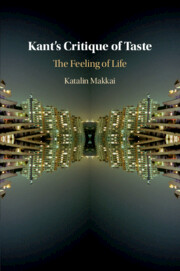Book contents
- Kant’s Critique of Taste
- Kant’s Critique of Taste
- Copyright page
- Contents
- Acknowledgments
- Note on Citations
- Introduction
- Chapter 1 The Art of Judgment
- Chapter 2 Communication and Animation in the Judgment of Taste
- Chapter 3 Subjectivity and Recognition in the Judgment of Taste
- Chapter 4 Modes of Attunement
- Chapter 5 Aesthetic Liking
- Bibliography
- Index
Chapter 1 - The Art of Judgment
Published online by Cambridge University Press: 07 April 2021
- Kant’s Critique of Taste
- Kant’s Critique of Taste
- Copyright page
- Contents
- Acknowledgments
- Note on Citations
- Introduction
- Chapter 1 The Art of Judgment
- Chapter 2 Communication and Animation in the Judgment of Taste
- Chapter 3 Subjectivity and Recognition in the Judgment of Taste
- Chapter 4 Modes of Attunement
- Chapter 5 Aesthetic Liking
- Bibliography
- Index
Summary
The Critique of Judgment is concerned with “judgment” as a power of the mind that is expressed in particular acts of judging. This is the sense we draw upon when we say of someone that they have good judgment, or when we put our trust in someone’s judgment. I consider Kant’s regress argument concerning judgment in the Analytic of the Principles of the first Critique. Kant has been read as concluding that if cognition is to be possible it must, on pain of infinite regress, bottom out in some non-rule-governed, “immediate” act or entity. I argue that this interpretation misconstrues the moral of Kant’s argument, as it does that of the rule-following passages in Wittgenstein’s Philosophical Investigations with which it is sometimes aligned. The point of Kant’s argument is that judgment must be exercised: this is its condition. Kant shares with Wittgenstein (properly read) an awareness of the desire that we may have to evade the exercise of judgment and the revelations of the self that it entails. Reflective judgment, as introduced in the third Critique, is a further development of the notion of judgment as necessarily exercised and reflective of a particular mind.
Keywords
- Type
- Chapter
- Information
- Kant's Critique of TasteThe Feeling of Life, pp. 34 - 69Publisher: Cambridge University PressPrint publication year: 2021

